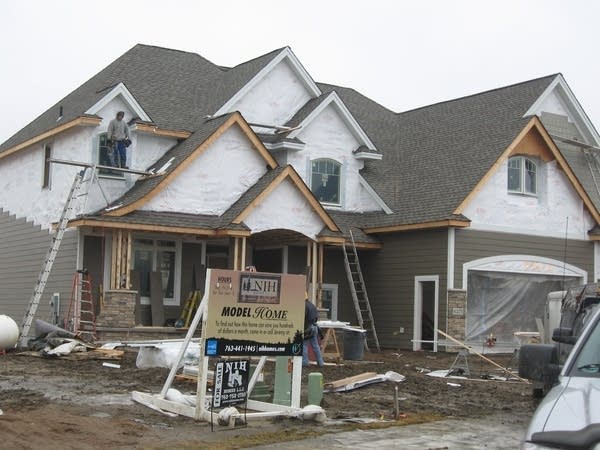Home builders get creative to survive
Go Deeper.
Create an account or log in to save stories.
Like this?
Thanks for liking this story! We have added it to a list of your favorite stories.

On a cul-de-sac tucked off a busy road in Maple Grove, workers are busy doing something pretty rare these days: building two new homes.
The builder, NIH Homes, finished another one last fall and sold it right away.

Jeremy Skogquist, NIH's vice president, said business is brisk now. But like other builders, NIH hit the skids in 2006.
"We're a family-owned business and we're a custom builder. Well, there are a lot of them out there. We were looking for a new way to explain how we were different from all the other builders," he said.
Turn Up Your Support
MPR News helps you turn down the noise and build shared understanding. Turn up your support for this public resource and keep trusted journalism accessible to all.
The company sought out a sales consultant to find a way out of the slump.
When they first sign the purchase agreement, I send a set of flowers to her work, saying that "Your new home's going to be beautiful.
The answer for Skogquist and his family lay in a new marketing strategy that's taking root within home building.
They became what's known as a "woman-centric" builder. NIH aims its home design and marketing at women.
"This [house] is really woman-centric," said NIH customer, Carolyn Cederberg. She and her husband bought a "woman-centric house" on that cul-de-sac in Maple Grove. "What woman wouldn't love to have a vanity like this?" It's like you're at the spa or the beauty salon." The Cederbergs had been looking for a new house, and Carolyn Cederberg said she fell for this one right away. It turns out that a lot of the design features deliberately aimed at women were compelling to her: little lights lining the bedroom ceiling, a spa, and lots of storage.
"Women love a lot of storage," Cederberg said.
Despite these touches, nothing about the house screams "feminine."
Builder Jeremy Skogquist said the features that appeal to women are meant to be pleasant for the whole family. But, he said, women tend to be the drivers of home purchases, so why not cater specifically to them?

Click here to see an audio tour of the Cederbergs' home.
His sales approach does just that. Women can fill out a online survey to see which of four profiles (named Margo, Elise, Claire, and Maggie) fit them best and reflect their taste in homes.
And, that's not all.
"When they first sign the purchase agreement, I send a set of flowers to her work, saying that "Your new home's going to be beautiful," Skogquist said. "So then all her coworkers see that, and ask who it came from." Even if it's formulaic, woman-centric building has brought NIH back to its peak homebuilding levels. Skogquist expects 2009 will be even better.
On the other side of the Twin Cities metro area, in Blaine, TJB Homes has also stayed afloat using creative techniques.
"Our sales are doing quite well. We're keeping houses moving."
Owner Tom Budzynski said one of their tools is a "home trade." He guarantees his customers will sell their old house at a set price.
"Their house goes up for sale. If it sold for more money, they got it. If it wasn't sold, we took it over, and we had to handle it after that."
Buyers are typically purchasing a new home that's more expensive than their old one, so they have to pay the difference in price.
Budzynski said since 1990, he's gotten stuck with three trade houses that didn't sell right away, but he eventually was able to unload them.
Joseph Strauss bought a house this way. He had been considering putting his house up for sale the usual way. But the trade went much faster.
"To resolve a sell and a buy in three days is almost beyond belief in this market," Strauss said.
TJB's owner Tom Budzynski said the company also has a few other tools for selling in a tough market. "Green" homes, an extensive Web site, and a stint building a house for charity on the TV show Extreme Makeover Home Edition also help bring in home buyers.
Budzynski said profits are still down about a third from their peak a few years ago. But he said the company's business is picking up. That makes him especially proud, when so many other homebuilders have simply folded.



